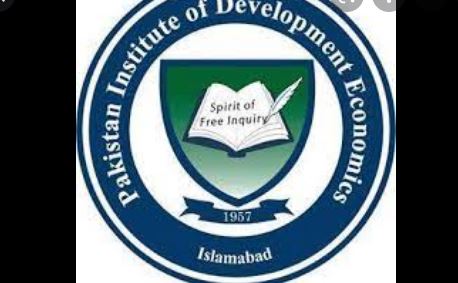PESHAWAR, NOV 24 /DNA/ – Today was the third day of the four-day 35th AGM and Conference of the Pakistan Society of Development Economists (PSDE), on “Opportunities to Excel: Now & the Future”, hosted by the Pakistan Institute of Development Economics (PIDE), in collaboration with the Institute of Management Sciences (IMSciences). The Conference is being sponsored by the World Bank Group, CPEC Center of Excellence, the Bank of Punjab, Friedrich-Ebert-Stiftung (FES), Gul Ahmed Textile Mills Limited, National Productivity Organization (NPO) Pakistan, HBL, Pakistan Poverty Alleviation Fund (PPAF), Saif Group of Companies, Pakistan Microfinance Investment Company (PMIC), Engro, and the Bank of Khyber.
The agenda for the second day included the prestigious Allama Iqbal lecture, delivered by Mr. Taimur Saleem Khan Jhagra, Finance Minister, KP, panel discussions on “Opportunities: The Role of the State”, “Opportunities for Firms to Grow” and “Shaping Success in the Creative Arts & Media”. The agenda also included M.L. Qureshi Lecture, delivered by Prof. Cass Sunstein, a professor at Harvard University. Besides these lectures and panel discussions, research papers on the topics of climate change, themes in development, urbanization, and financial institutions were presented in technical sessions.
Mr. Taimur Khan Jhagra, the Minister for Finance, Khyber Pakhtunkhwa, started by stressing on the youth of the day that ambition, hope, and perseverance are the three key words they need to grab hold of, or create opportunities for themselves. There will be disappointments along the way, but one must never lose hope. Never compromise on principles. This is how individuals, communities and nations succeed. Moreover, change is inevitable, and we have to crack open the doors that resist any positive change.
Reforms initiated by the government in the province reduced inefficient resource allocations by slashing its development budget from PKR 600 billion down to PKR 400 billion. The funds were reallocated to high priority projects, having greatest impact. In addition, he informed the plenary that in just two years the revenues of the province have almost doubled. The Minister also explained how a difficult situation was turned into positive change, creating opportunities for the people. In conclusion, Mr. Jhagra said that the youth of Pakistan in general and Khyber Pakhtunkhwa in particular, have immense potential to turn hard times into opportunities.
Moderating the panel discussion on role of the state, Dr. Ishrat Hussain expressed the view that the debate between market and state will be incomplete without incorporating the civil society. Our discourse on the role of the state must move beyond running diagnostics and looking at micro-level issues instead of focusing on the big issues such as contract enforcement and barriers to entry. The 21st century warrants the existence of a strong state, a dynamic market and a vibrant civil society. The first panelist, Dr. Mohsin stated that it is not the job of the government to create jobs. It is not the government’s business to be in business. Dr. Waqar highlighted the incidence of high administrative costs leading to creation of sludge and friction in the Pakistan economy. Regulation should be directed at the removal of this sludge. Dr. Gonzalo said that the entry of firms in the Pakistani market is very low, and the reason behind this is government processes and bureaucratic hurdles. Omer Gillani discussed that we need to talk about inclusion of those who are totally excluded. Court procedures are not directed at contract enforcements and efficiency because the origin of Pakistani civil courts is in revenue generation rather than enabling contract enforcement.
When it comes to economic growth, most discussions tend to revolve around macroeconomic policies. In the Panel Discussion on ‘Opportunities for Firms to Grow’, the panelists attempted to address the questions surrounding determinants of growth at a more micro and firm level. The panelists highlighted the importance of deregulation when it comes to reducing barriers to entry and minimizing costs of doing business for individual firms. This consequently at an aggregate level can drive an increase in economic activity across a range of sectors and enable sustained economic growth.
Due to a myriad of reasons, Pakistan has only a handful of large firms in the economy. The dearth of efficient large firms means that on average Pakistani firms have low productivity, minimal capital accumulation, and negligible returns to scale. This low productivity of Pakistani firms is troublesome given the deep relationship that firm productivity has with GDP growth. Depending on which definition one uses, about 90 percent of the firms in the country are small and medium enterprises. These firms also have issues of their own, particularly as in a highly regulated environment, the marginal costs for these firms are relatively high owing to their small size.
There was a consensus among the panelists that the government should minimize its footprint on the economy and let vibrant private firms enter the market and grow in size. This does not mean that the government has no role to play, rather it should serve as a custodian and create policies that attract both domestic and foreign investment in the markets.
The research presented during the technical sessions highlighted farmers are vulnerable to climate change and that adaptations to variabilities are mandatory to offset losses. There is a need for the development of heat and drought resistant crop varieties to ensure food security in the country. Rapid urbanization is a concern for developing economies of South Asia, including India and Pakistan, and there is a dire need for more research to understand and have an insight into the underlying factors of urbanization in Pakistan. Real estate residential property market prices are systematically related to a diversity of factors, including property location, neighborhood, environment, and structure of properties, and reputation of the housing authority.












